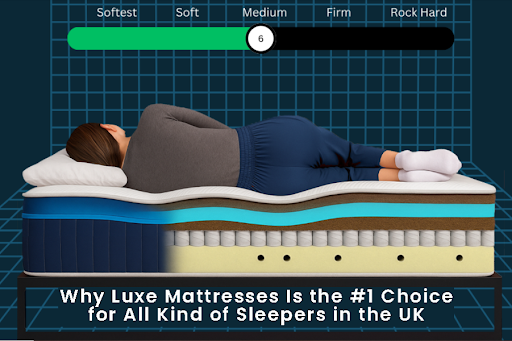When it comes to achieving deep, restorative sleep, advice from medical professionals can make all the difference. While a good night’s rest is often chalked up to basic lifestyle habits such as minimizing screen time or cutting down caffeine, the truth is that sleep quality goes much deeper and often begins with what you’re lying on.
Doctors and chiropractors have long emphasized the importance of spinal health, postural alignment, and support in maintaining both short- and long-term well-being. These elements don’t just play a role during your waking hours but are critically important while you’re sleeping too. As it turns out, what your mattress does during those 6 to 8 hours can make or break your physical health.
In this article, we’ll explore what healthcare professionals recommend when it comes to achieving better sleep and dive into how the right mattress, especially one with orthopaedic benefits, can contribute to a healthier, more comfortable life.
The Medical Perspective on Sleep
Sleep is one of the most vital functions our bodies perform, but many people still struggle with it. According to the NHS, around one-third of adults in the UK experience chronic sleep problems. When people seek medical help for persistent back pain, neck stiffness, or interrupted sleep, doctors often look beyond symptoms and assess the lifestyle and environment that may be influencing those problems.
Dr. Susan Gregory, a general practitioner based in London, shares, “The surface someone sleeps on plays a huge role in musculoskeletal health. If your mattress doesn’t support your natural spinal alignment, you’re going to wake up with tension and pain, no matter how well you eat or exercise.”
Chiropractors echo this sentiment. They often work with patients who suffer from chronic conditions like sciatica, arthritis, or disc degeneration. These professionals understand that the spine is especially vulnerable at night when the body is at rest and muscle tone is reduced.
Why Proper Support Matters
Imagine your spine as a bridge supported by muscles and ligaments. During the day, your posture and movement help regulate spinal pressure. But at night, your body becomes passive. That’s when your mattress must take over, offering targeted support that cradles pressure points and distributes weight evenly.
When the body isn’t properly supported, tension builds in critical areas like the lower back, neck, and shoulders. Over time, poor support can lead to posture-related problems and exacerbate chronic pain.
Doctors often recommend evaluating your mattress if you’re experiencing:
- Morning stiffness or aches
- Frequent tossing and turning
- Sleep that doesn’t feel restorative
- Increased joint or back pain upon waking
If any of these symptoms sound familiar, it’s time to reassess what you’re sleeping on.
Mattress Types Doctors and Chiropractors Prefer
Healthcare professionals often lean toward mattresses that offer firm yet adaptive support. That doesn’t necessarily mean the hardest mattress in the store. Instead, they look for materials and designs that promote spinal alignment and prevent excessive sinkage.
Memory Foam
Memory foam mattresses are praised for their pressure relief and contouring properties. These mattresses mold to your body and help eliminate pressure points. However, some medical professionals caution that if the foam is too soft, it might not offer sufficient lower back support for heavier individuals.
Latex
Latex is naturally breathable and offers more bounce than memory foam. It’s hypoallergenic and has antimicrobial properties, making it suitable for those with allergies or respiratory conditions. Doctors like latex for its combination of firmness and responsiveness.
Hybrid
Hybrid mattresses combine foam and spring systems, offering both contour and support. Chiropractors often recommend these for people who want the pressure relief of foam with the structural integrity of a spring base.
The Rise of Orthopaedic Mattresses
Orthopaedic mattresses are specially designed to support the joints, back, and overall body. Initially developed for medical use, these mattresses have gained widespread popularity among the general public for their health benefits.
They typically offer the following features:
- Zoned support to target different body areas
- High-density foam or latex for firmness
- Reinforced edges to prevent roll-off
- Breathable materials to regulate temperature
Medical professionals often recommend an orthopaedic mattress for back pain to patients recovering from surgeries, injuries, or chronic back conditions. These mattresses help maintain spinal alignment and prevent the muscles from overcompensating, leading to deeper, uninterrupted sleep.
Other Sleep Enhancers Doctors Suggest
While the mattress plays a starring role, it’s not the only factor. Here are other sleep essentials endorsed by doctors and chiropractors:
Pillow Support
The right pillow keeps your neck aligned with your spine. Side sleepers benefit from thicker pillows, while back sleepers may need something thinner.
Sleep Posture
Doctors recommend sleeping on your back or side. Stomach sleeping can hyperextend the spine, leading to discomfort.
Temperature Regulation
Cooler room temperatures and breathable bedding can reduce night sweats and promote deeper sleep.
Routine and Sleep Hygiene
Maintaining a regular sleep schedule, limiting screen time before bed, and creating a calming pre-sleep ritual are strongly recommended.
Choosing the Right Mattress: A Checklist
If you’re in the market for a new mattress, keep this doctor-approved checklist in mind:
- Firmness Level: Choose a medium-firm mattress if you’re unsure. It suits most body types and sleeping positions.
- Body Weight: Heavier individuals may need firmer support; lighter individuals often prefer softer surfaces.
- Zoned Support: Look for mattresses that offer different support levels for shoulders, hips, and legs.
- Trial Periods: Select brands that offer sleep trials, so you can truly assess comfort over time.
- Warranty: A long-term warranty often indicates quality and durability.
Final Thoughts
Doctors and chiropractors agree: a quality mattress isn’t just a comfort item, it’s a healthcare investment. When chosen wisely, the right mattress can improve your posture, reduce chronic pain, and enhance overall sleep quality.
While many options exist, focusing on medically recommended designs like orthopaedic mattresses ensures you’re supporting your body’s long-term health.
In a world where we’re bombarded with wellness trends and quick fixes, sometimes the most powerful changes come from the simplest places—like your own bed.
So, the next time you wake up with aches and stiffness, don’t reach for the painkillers just yet. First, ask yourself this: is your mattress helping your body heal or hurting it?
Keep an eye for more latest news & updates on Hoseasons!

